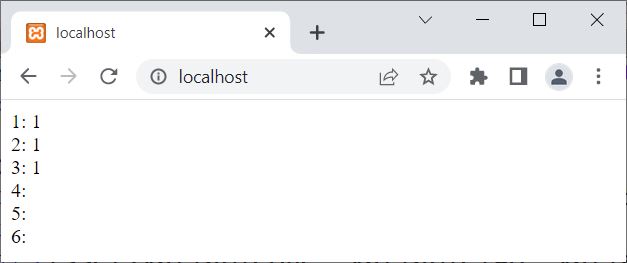- PHP Basics
- Learn PHP
- PHP Comments
- PHP Data Types
- PHP Variables
- PHP Operators
- PHP echo
- PHP print
- PHP echo vs. print
- PHP if else
- PHP switch
- PHP for Loop
- PHP while Loop
- PHP do...while Loop
- PHP foreach Loop
- PHP break and continue
- PHP exit()
- PHP exit() vs. break
- PHP isset()
- PHP Arrays
- PHP print_r()
- PHP unset()
- PHP Strings
- PHP Functions
- PHP File Handling
- PHP File Handling
- PHP Open File
- PHP Create a File
- PHP Write to File
- PHP Read File
- PHP feof()
- PHP fgetc()
- PHP fgets()
- PHP Close File
- PHP Delete File
- PHP Append to File
- PHP Copy File
- PHP file_get_contents()
- PHP file_put_contents()
- PHP file_exists()
- PHP filesize()
- PHP Rename File
- PHP fseek()
- PHP ftell()
- PHP rewind()
- PHP disk_free_space()
- PHP disk_total_space()
- PHP Create Directory
- PHP Remove Directory
- PHP Get Files/Directories
- PHP Get filename
- PHP Get Path
- PHP filemtime()
- PHP file()
- PHP include()
- PHP require()
- PHP include() vs. require()
- PHP mysqli Tutorial
- PHP mysqli Tutorial
- PHP and MySQL Setup
- PHP mysqli: Create Database
- PHP mysqli: Create Table
- PHP mysqli: Insert Record
- PHP mysqli: Update Record
- PHP mysqli: Fetch Record
- PHP mysqli: Delete Record
- PHP mysqli: SignUp Page
- PHP mysqli: LogIn Page
- PHP mysqli: Store User Data
- PHP mysqli Functions
- PHP mysqli_connect()
- PHP mysqli_close()
- PHP mysqli_connect_errno()
- PHP mysqli_connect_error()
- PHP mysqli_query()
- PHP mysqli_fetch_row()
- PHP mysqli_fetch_assoc()
- PHP mysqli_fetch_array()
- PHP mysqli_free_result()
- PHP mysqli_error()
- PHP mysqli_prepare()
- PHP mysqli_stmt_bind_param()
- PHP mysqli_stmt_execute()
- PHP mysqli_stmt_fetch()
- PHP mysqli_stmt_store_result()
- PHP mysqli_stmt_num_rows()
- PHP mysqli_stmt_bind_result()
- PHP mysqli_stmt_get_result()
- PHP mysqli_result class
- PHP mysqli_report()
- PHP error_reporting()
- PHP mysqli_real_escape_string()
- PHP htmlspecialchars()
- PHP Misc Topics
- PHP Object Oriented
- PHP new Keyword
- PHP header()
- PHP getallheaders()
- PHP Cookies
- PHP Sessions
- PHP Date and Time
- PHP GET vs. POST
- PHP File Upload
- PHP Image Processing
PHP isset(): Check if a variable is set
The PHP isset() function is used when we need to check whether a variable is set or not. For example:
<?php
if(isset($x))
{
echo "Variable \$x is set";
}
else
{
echo "Variable \$x is not set";
}
?>
Since the variable $x is not set, the output of the above example is:

PHP isset() Syntax
The syntax of the isset() function in PHP is:
isset(variableOne, variableTwo, variableThree, ..., variableN);
At least one variable is required. Returns 1 if all given variables exist and are not NULL. Otherwise, it returns false or nothing. For example:
<?php $x = 10; $y = 20; $z = 30; echo "1: ", isset($x), "<BR>"; echo "2: ", isset($x, $y), "<BR>"; echo "3: ", isset($x, $y, $z), "<BR>"; echo "4: ", isset($a), "<BR>"; echo "5: ", isset($x, $a), "<BR>"; echo "6: ", isset($x, $y, $s), "<BR>"; ?>
The output of this PHP example using the isset() function is shown in the snapshot given below:

In the above example, the returned value 1 by the isset() function can also be considered true.
PHP isset() example
Consider the following PHP code as an example demonstrating the "isset()" function.
<?php
$a = 10;
$b = 0;
$c = "codescracker.com";
$d = "PHP is Fun!";
$e = 12.42;
$f = true;
$g = null;
if(isset($a))
echo "<p>The variable \$a is set, with $a</p>";
if(isset($b))
echo "<p>The variable \$b is set, with $b</p>";
if(isset($c))
echo "<p>The variable \$c is set, with $c</p>";
if(isset($d))
echo "<p>The variable \$d is set, with $d</p>";
if(isset($e))
echo "<p>The variable \$e is set, with $e</p>";
if(isset($f))
echo "<p>The variable \$f is set, with $f</p>";
if(isset($g))
echo "<p>The variable \$g is set, with $g</p>";
if(isset($z))
echo "<p>The variable \$z is set, with $z</p>";
if(isset($myvar))
echo "<p>The variable \$myvar is set, with $myvar</p>";
?>
The output should be:
The variable $a is set, with 10 The variable $b is set, with 0 The variable $c is set, with codescracker.com The variable $d is set, with PHP is Fun! The variable $e is set, with 12.42 The variable $f is set, with 1
You can also print the counterpart, that is, the message when a variable is not set or defined, in this way:
<?php
if(isset($myvar))
echo "<p>The variable \$myvar is set, with $myvar</p>";
else
echo "<p>The variable \$myvar is not set</p>";
?>
Or directly using:
<?php
if(!isset($myvar))
echo "<p>The variable \$myvar is not set</p>";
?>
Since, in both the examples above, the variable $myvar is not set, the output of these two codes should be:
The variable $myvar is not set
« Previous Tutorial Next Tutorial »